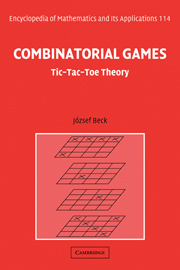Book contents
- Frontmatter
- Contents
- Preface
- A summary of the book in a nutshell
- PART A WEAK WIN AND STRONG DRAW
- PART B BASIC POTENTIAL TECHNIQUE – GAME-THEORETIC FIRST AND SECOND MOMENTS
- Chapter III Simple applications
- Chapter IV Games and randomness
- PART C ADVANCED WEAK WIN – GAME-THEORETIC HIGHER MOMENT
- PART D ADVANCED STRONG DRAW – GAME-THEORETIC INDEPENDENCE
- Appendix A Ramsey Numbers
- Appendix B Hales–Jewett Theorem: Shelah's proof
- Appendix C A formal treatment of Positional Games
- Appendix D An informal introduction to game theory
- Complete list of the Open Problems
- What kinds of games? A dictionary
- Dictionary of the phrases and concepts
- References
Chapter III - Simple applications
Published online by Cambridge University Press: 06 July 2010
- Frontmatter
- Contents
- Preface
- A summary of the book in a nutshell
- PART A WEAK WIN AND STRONG DRAW
- PART B BASIC POTENTIAL TECHNIQUE – GAME-THEORETIC FIRST AND SECOND MOMENTS
- Chapter III Simple applications
- Chapter IV Games and randomness
- PART C ADVANCED WEAK WIN – GAME-THEORETIC HIGHER MOMENT
- PART D ADVANCED STRONG DRAW – GAME-THEORETIC INDEPENDENCE
- Appendix A Ramsey Numbers
- Appendix B Hales–Jewett Theorem: Shelah's proof
- Appendix C A formal treatment of Positional Games
- Appendix D An informal introduction to game theory
- Complete list of the Open Problems
- What kinds of games? A dictionary
- Dictionary of the phrases and concepts
- References
Summary
The results formulated in the previous chapter (Chapter II) will be proved in Chapters V–IX, that is, we will need 5 chapters, more than 250 pages! Chapter III lays an intermediate role: it is a preparation for the main task, and also it answers some of the questions raised in Section 4. For example, in Section 15 we discuss an interesting result related to Kaplansky's n-in-a-line game.
The main goal of Chapter III is to demonstrate the amazing flexibility of the potential technique on a wide range of simple applications.
Easy building via Theorem 1.2
Some of the statements formulated in Chapter II have easy proofs. So far we proved two potential criterions, both simple: (1) the Weak Win criterion Theorem 1.2, and (2) the Strong Draw criterion Theorem 1.4 (“Erdős-Selfridge”). In a few lucky cases a direct reference to Theorem 1.2 supplies the optimal result.
Weak Win in the Van der Waerden Game. A particularly simple example is the upper bound in Theorem 8.1 (“arithmetic progression game”). We recall the (N, n) Van der Waerden Game: the board is [N] = {1, 2, … N} and the winning sets are the n-term A.P.s (“arithmetic progressions”) in [N].
Information
- Type
- Chapter
- Information
- Combinatorial GamesTic-Tac-Toe Theory, pp. 195 - 229Publisher: Cambridge University PressPrint publication year: 2008
